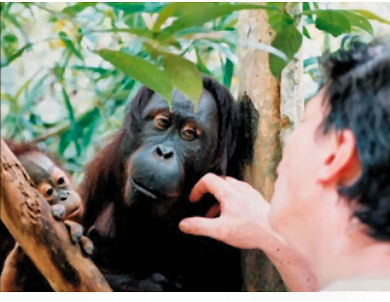The picture above shows an orangutang rescued from the rubbish heap as a baby, now thriving with its own baby.
But this isn't just a tale of a few sad orangutangs living on the edge...
Recreating Eden
Willie Smits went back at night to a market where he had seen a very sick baby orangutang in a cage and was not surprised to find that it had been discarded onto a rubbish heap and left to die. He forced it to drink and saved its life. Soon he had 1000 oranutangs and nowhere to put them.
So he found some very degraded land and reclaimed it. In less than a decade the land was reinvigorated and could provide shelter and incomes to many families as well as a healthy population of orangutangs. He integrated this reclamation with empowerment of the local people whose economic fortunes, he was able to show them, were inextricably linked to the health of orangutangs. He was very careful to make government absolutely transparent and describes what was necessary.
They grew a biodiverse forest with seeds planted in orangutang dung. Then many birds and animals found the forest, very quickly. How wonderful!
This is an incredible film, all biologically credible. It occurs in a third world country where the dyak people (the forest people) have been dispossessed and murdered by Indonesian colonists. The people in the area in question had high infant mortality, high alcoholism and lived in misery.
Rainmaking
The film gives a quick overview of the science of rain-making in the tropics and says that there is a different dynamic there from dry forest rain. However, rehydrating the forest is a matter of how and what you plant.
Now the rainfall in this area is huge. The continual forest fires have stopped.
This could happen in Victoria.
I found out about this film from Natural Sequence Farming, which is an Australian method for rehydrating land. I have been discussing forest rehydration in Victoria, Australia to stop this place burning up completely.

 click here for film
click here for film
Comments
Vivienne (not verified)
Tue, 2009-08-11 09:32
Permalink
It is left to grass-roots volunteer and lobby groups!
Our Australian government is intent on capitalism, or on supporting growth industries in livestock, minerals and people! If we had some environment ministries that were actually intent on ecological enhancement and native species regeneration schemes rather than compromising on "best practices" for industrial expansion and "sustainable" use of natural resources for profits, maybe there could be some restoration and rehydration of landscapes. Peter Garrett is more intent on passing environmental impact statements and giving the final ticks of approval to developments and projects! He has the ultimate say for Commonwealth approved projects and he has the decision-making role. Mr Garrett gave the go-ahead for the Four Mile Mine, 550km north of Adelaide despite as the lead singer of rock band Midnight Oil, he railed against the uranium industry!
With such phoney and 2 dimensional leaders, it is hard to achieve any real environmental replenishment. It is left to grass-roots volunteer and lobby groups to do the real work!
Wild orang-utans are under increasing threat of extinction as their native rainforest habitat is razed for palm oil plantations to supply the world's food and soap product manufacturers.
An estimated 40 per cent of Australian groceries contain palm oil but manufacturers are not required to list it as an ingredient, so most consumers are unwittingly buying products containing the oil. All products should be clearly labelled as obtained and certified sustainably and ethically produced.
www.ethical.com.au has a list of free, recycled, fair trade and cruelty free products to down-load.
quark
Sat, 2010-01-02 09:41
Permalink
Lobby groups
Sheila Newman
Sat, 2010-01-02 10:50
Permalink
commercial lobby groups using community info
Add comment